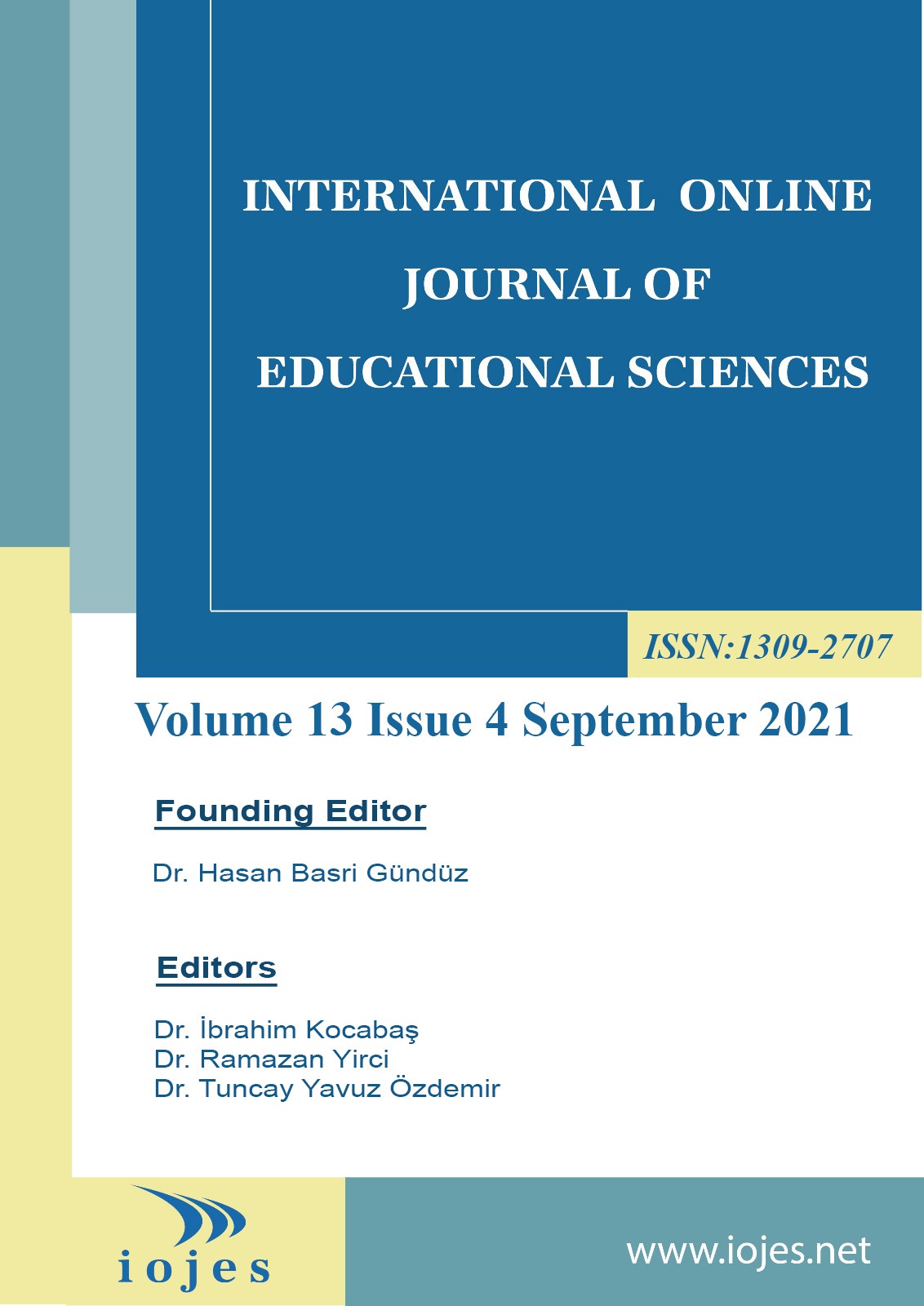Examination of the Relationship Between Pre-service Teachers' Attitudes Towards Learning and Sustainable Learning Levels
Author :
Abstract
Keywords
Abstract
In this study, relationship between pre-service teachers' attitudes towards learning and sustainable learning levels are examined. Sample of the study consists of 428 pre-service teachers studying at Tekirdag Namik Kemal University. Scale for Attitudes Towards Learning and Scale for Sustainable Learning were used throughout the study. Data obtained during the study were analyzed by arithmetic average, standard deviation, correlation analysis and regression analysis. According to findings, it is determined that pre-service teachers' attitudes towards learning and sustainable learning levels are at high levels. At the end of conducted regression analysis, it is found that scores obtained by means of scale for pre-service teachers' attitudes towards learning predict scores belonging to both cognitive and behavioral sub-scales of sustainable learning scale at a remarkable accuracy. Obtained findings are discussed in accord with relevant literature and suggestions were presented.
Keywords
- Adıgüzel, A. (2014). Examining the relationship between teacher candidates' attitudes towards learning and information literacy skills in terms of various variables. International Journal of Curriculum and Instructional Studies, 4(7), 13-24.
- Anghelache, V. (2013). Determinant factors of students’ attitudes toward learning. Procedia-Social and Behavioral Sciences, 93, 478-482.
- Aydın, M. (2016). Examination of pre-service science teachers' attitudes towards learning according to some variables. The Journal of International Lingual, Social and Educational Sciences, 2(2), 75-84.
- Balcı, A. (2010). Annotated glossary of educational administration terms. Ankara: Pegem Academy Publishing.
- Becker, C. U. (2012). Sustainability ethics and sustainability research. Heidelberg: Springer.
- Can, A. (2014). Quantitative data analysis in scientific research process with SPSS. Pegem Academy Publishing.
- Chang, W. & Chang, I. (2013). An investigation of students’ motivation to learn and learning attitude affect the learning effect: A case study on tourism management students. Anthropologist, 16(3), 457-463.
- Charungkaittikul, S., & Henschke, J. A. (2014). Strategies for developing a sustainable learning society: An analysis of lifelong learning in Thailand. International Review of Education, 60(4), 499-522.
- Çetin, Ş., & Çetin, F. (2019). Attitude towards learning scale development study. Journal of Turkish Educational Sciences, 17(1).
- Dash, G., & Mohan, A. K. (2017). Education for sustainability: perception of teachers and practices in urban primary schools of Mysore. Gyanodaya-The Journal of Progressive Education, 10(2), 9-17.
- Domjan, Michael (2004). Basics of conditioning and learning. Ankara: Turkish Psychological Association Publications.
- Erdamar, G. (2010). Some variables that affect teacher candidates' study strategies. Journal of Hacettepe University Faculty of Education, 38(38), 82-93.
- Eskici, M. (2019). Sustainable learning levels of high school students. Discourse and Communication for Sustainable Education, 10(1), 63-80.
- George, D., & Mallery, P. (2003). SPSS for Windows step by step: Answers to selected exercises. A simple guide and reference, 63, 1461-1470.
- Graham, L., Berman, J., & Bellert, A. (2015). Sustainable learning. Cambridge University Press.
- Johnston, P., Everard, M., Santillo, D., & Robèrt, K. H. (2007). Reclaiming the definition of sustainability. Environmental science and pollution research international, 14(1), 60-66.
- Kağıtçıbaşı, C. (1999). New man and people. Social Psychology Series: 1. Istanbul: Evrim Press Publishing and Distribution Publishing.
- Karasakaloğlu, N. (2012). The Relationship between reading comprehension and learning and study strategies of prospective elementary school teachers. Educational Sciences: Theory & Practice, 12(3).
- Karasar, N. (2005). Scientific research method. Ankara: Nobel Publishing.
- Kazazoğlu, S. (2013). The effect of attitude towards Turkish and English lessons on academic achievement. Education and Science, 38(170). 294-307.
- Kolb, D.A. (1981). Learning styles and disciplinary differences. In A. Chickering (Ed.). The modern American College. San Francisco. CA: Jossey Bass.
- Krejcie, R. V., & Morgan, D. W. (1970). Determining sample size for research activities. Educational and Psychological Measurement, 30(3), 607-610.
- Kuşat, N. (2012). Corporate sustainability and its internal elements for sustainable businesses. Journal of Economics & Administrative Sciences, 14(2).
- Marton, F. & Saljo, R. (1997). Approaches to learning. In Marton, F., Hounsell, D., Entwistle, N.(ed.). The experience of learning. Edinburgh: Scottish Academic Press.
- Orhan, U., & Komşu, U. C. (2016). The effect of self-efficacy perceptions and burnout levels on attitudes towards learning and job satisfaction in academicians. Anadolu University Journal of Social Sciences, 16(3), 1-18.
- Öztürk, M. (2017). Sustainable development-oriented education: Theoretical framework, historical development and practical recommendations. Elementary Education Online, 16(4).
- Pashler, H., McDaniel, M., Rohrer, D., & Bjork, R. (2008). Learning styles: Concepts and evidence. Psychological science in the public interest, 9(3), 105-119.
- Pehlivan, K. B. (2010). A study on prospective teachers' learning styles and attitudes towards the teaching profession. Elementary Education Online, 9(2), 749-763.
- Prokop, P., Lešková, A., Kubiatko, M., & Diran, C. (2007). Slovakian students’ knowledge of and attitudes toward biotechnology. International Journal of Science Education, 29(7), 895-907.
- Salami, S. O. (2010). Emotional intelligence, self efficacy, psychological well-being and students’ attitudes: Implications for quality education. European Journal of Educational Studies, 2(3), 247- 257.
- Samuelsson, I. P., & Park, E. (2017). How to educate children for sustainable learning and for a sustainable world. International Journal of Early Childhood, 49(3), 273-285.
- Senemoğlu, N. (2012). Development, learning and teaching: From theory to practice. Ankara: Pegem Academy Publishing.
- Thomas, I. (2009). Critical thinking, transformative learning, sustainable education, and problem-based learning in universities. Journal of Transformative Education, 7(3), 245-264.
- UNESCO. (2020). One Planet, One Ocean. https://en.unesco.org/themes/one-planet-one-ocean
- Yang, H., Farn, C. (2005). An ınvestigation the factors affecting MIS student burn-out in technical-vocational college. Computers in Human Behaviour, 21, 917-932.
- Zhu, Y., Zhang, J. H., Au, W., & Yates, G. (2020). University students’ online learning attitudes and continuous intention to undertake online courses: A self-regulated learning perspective. Educational Technology Research and Development, 1-35.





